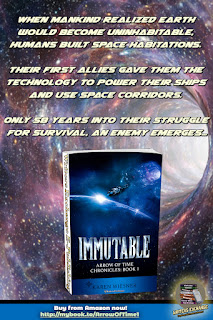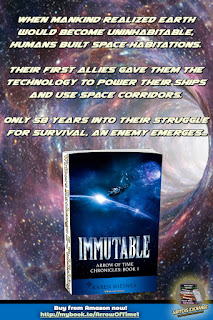Of Research and Developmental Tool Requirements, Part 1:
Surprise #2: Research Overwhelm
This is the fourth of fifteen posts dealing with surprising things I learned in the course of writing a science fiction series.
The eye-openers I had while writing my sci-fi series will be presented in two parts. This week we'll deal with the research overwhelm while Part 2, coming next week, will cover my underwhelm with the developmental tools I found available.
The second surprise I had in learning how to write in the science fiction genre was the sheer amount of research required. In advance of writing a word of my Arrow of Time Chronicles, I spent the entire summer of 2018 doing massive amounts of research, some of it the Standard Operative Procedure stuff I mentioned in my post last week. Talk about overload. These items I researched were all things I wanted to mention in the first book of the series as they came up, thus setting down the SOPs in my unique galaxy. Basically, I wanted them to be planted deeply there so I wouldn't need to dwell on any of that in future volumes. I filled five medium binders and one enormous one with everything "foundational" I would need to write the series.
In terms of research, that summer in 2018 was only the beginning of what was required. I call that my advance research stage. During that time, I accomplished only the establishment of the SOP foundational aspects of my series. For each outline that preceding the written draft of what eventually became the four books in the series (originally, I intended it to be a trilogy), enormous amounts of research were a necessity. There were times I worried the research would take over so much I'd never get to the point of actually writing the story itself.
Book 1 started the process of outlining the story scene by scene,
and, while I outlined, I also performed all the necessary research each scene
required. Let me tell you, it was intense. Seriously, things authors never have
to think about to write a book set in modern, uncomplicated times came up all
throughout outlining and writing these novels. Here's a taste of some of the
countless considerations I had to come up with plausible explanations for--and
somehow make talking about them brief:
How do you take a
shower on a space ship, and how often? Is every day allowed or are there
limitations because of resources, etc.
If something's
wrong on a space ship, is there a human resources department you can complain
to?
When constructing a space habitation, where do you get the building materials?
For one of the cultures (which is what I called the alien races), I decided to make the way they measure time a little different, considering the unique orbital and tidal functions of their planet. So this became the standard in all the books:
A revolution is 1 year (i.e., 80 revolutions is 80 years).
A tide cycle is 12 hours, two tide cycles is 24 hours, half a tide
cycle is 6 hours.
A spin is also a way to reference one day's time.
An age can refer to an undefined but "long" amount of time.
Believe me, trying to remember to write a "spin" instead of a "day" whenever characters in that culture spoke could have presented quite a consistency issue if I wasn't diligent.
Those are some of the less "major" items I had to come up with plausible, brief explanations for, but if you can imagine nearly scene I outlined had endless little questions like this that needed to be answered before I could continue to tell my tale. These are the things that helped me understand the world I was building into each and every installment (and, don't be surprised, but I filled binders and binders with this stuff I cataloged so they were easy to grab if I needed to look something up while I was working).
In any case, the continuous research I had to do for this series felt utterly bottomless from start to finish. But those little questions I was forced to think about, design a creative solution for, and present in intriguing brevity are the very things that gave the series stories such vibrant flair and color.
In Part 2 of this article coming up next week, we'll talk about my underwhelm with the developmental tools available to write science fiction.
Happy writing!

Based on Writing the Overarching Series (or How I Sent a Clumsy Girl into Outer Space): 3D Fiction Fundamentals Collection by Karen S. Wiesner (release date TBA)
https://karenwiesner.weebly.com/writing-reference-titles.html
http://www.writers-exchange.com/3d-fiction-fundamentals-series/
Karen Wiesner is an award-winning,
multi-genre author of over 140 titles and 16 series, including the romantic science fiction series,
ARROW OF TIME CHRONICLES
https://www.writers-exchange.com/arrow-of-time-chronicles/
https://karenwiesner.weebly.com/arrow-of-time-chronicles.html











































